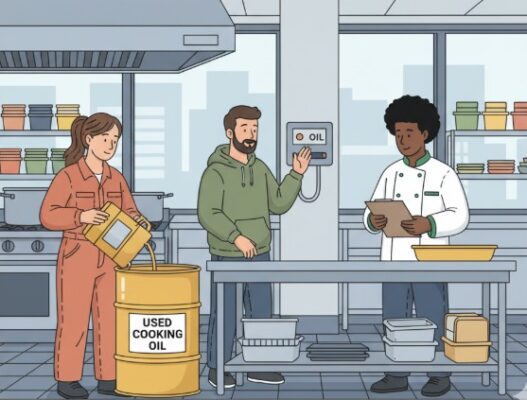
Guide to Miami-Dade FOG & GDO Compliance for Restaurants (2025 Edition)

Miami-Dade County expects all non-residential food service establishments to obtain FOG Discharge Control operating permits and stick to strict grease management regulations.
Restaurants, cafeterias, and other food businesses must comply with requirements such as grease interceptor installation, regular maintenance, and meticulous record-keeping to avoid costly violations.
Every restaurant and food service establishment in Miami-Dade is required to obtain a Grease Discharge Operating (GDO) permit annually.
They also need to follow the 25% rule for grease trap maintenance to stay on the right side of DERM regulations.
The Department of Environmental Resources Management runs the show with an FOG program that covers everything from initial permits to surprise inspections.
If you follow these regulations, you’ll avoid fines and keep your restaurant running smoothly.
Here’s a rundown on permit applications, installation musts, maintenance schedules, and getting ready for inspections—everything you need to keep your business compliant through 2025.
Key Takeaways
- Miami-Dade restaurants and food service establishments must obtain annual GDO permits and adhere to grease management rules.
- Grease interceptors must be sized, installed, and maintained correctly, with pump-out schedules documented.
- DERM inspections verify manifests, records, and proof that you use permitted haulers—skip this and you risk violations.
What “FOG” and the Miami-Dade GDO Permit Mean for Restaurants

FOG stands for Fats, Oils, and Grease. Basically, it’s all the stuff—cooking byproducts like fryer oil, butter, meat grease, sauces—that comes from running a kitchen.
Miami-Dade County requires a Grease Discharge Operating (GDO) Permit. You’ll also see it called a FOG Discharge Control operating permit.
The county implemented these FOG regulations following a 2018 federal court order. The law kicked in on March 5, 2018.
Who Needs a GDO Permit
If your restaurant handles, prepares, or processes food, you need this permit. It covers any spot that sends—or could send—FOG into the public sewer system.
Common FOG generators include:
- Restaurants
- Cafeterias
- Food courts
- Banquet halls
Key Permit Details
GDO permits are non-transferable and must be renewed annually. All permits expire on December 31.
The county’s FOG program keeps grease out of the sewer system. That helps avoid blockages and environmental headaches.
Who Needs a Grease Interceptor and When It Must Be Installed

Miami-Dade County requires food service businesses to install grease traps or interceptors to manage FOG effectively. This applies to any commercial kitchen that produces greasy wastewater.
Required Establishments:
- Restaurants and cafes
- Cafeterias and dining halls
- Catering businesses
- Food trucks and mobile vendors
- Bakeries with fryers
- Commercial kitchens in hotels
You need a grease interceptor if your place sends wastewater with FOG into the sewer. The county implemented these rules to address issues with grease discharge.
Installation Timeline:
Business owners must have grease traps installed before opening. The FOG program took effect on March 5, 2018, so all qualifying food businesses must comply.
Permit Requirements:
When you install a grease trap, you have to submit a Grease Interceptor Permit Application to Miami-Dade’s Water and Sewer Department. You can’t start the installation until you get the green light.
Once the traps are in place, the county requires documentation and regular maintenance. If you skip these steps, you risk penalties.
Sizing, Installation, and Acceptable Devices (Gravity vs. Hydromechanical)
Miami-Dade County outlines sizing rules for grease interceptors based on the device’s capacity. The FOG 2.5 Control Device Guidance Manual has the details for engineers.
Gravity Interceptors rely on classic sizing methods. They use drainage fixture units, flow rates, and 30-minute retention times.
Hydromechanical Interceptors are different. These smaller units use mechanical separation, not just gravity, to trap grease.
Key Differences
| Feature | Gravity | Hydromechanical |
| Design | Repurposed septic tank style | Compact mechanical unit |
| Flow Control | Uncontrolled | Controlled flow rates |
| Sizing Method | Liquid capacity + retention time | Flow rate calculations |
| Footprint | Large installation area | Smaller space requirement |
| Installation Cost | Up to $40,000 | Lower installation costs |
The cost gap between gravity and hydromechanical systems is big.
Miami DERM now wants 99% efficiency-compliant systems with solids interceptors, grease interceptors, and sampling ports. Only grease waste lines can hook up to these devices.
Restaurant owners must select the right system based on their space, layout, and budget. It’s not always obvious which one’s best—sometimes you just have to weigh your options.
If you’re ready to get started, call us now!
GDO Permit Application, Renewals, and Change-of-Ownership Requirements
Every non-residential food facility in Miami-Dade County needs a FOG Discharge Control operating permit before opening its doors. If your business handles, prepares, or processes food, this rule applies to you.
Initial Application Process
If you’re in a city or municipality, get your Municipal Occupational License and Certificate of Use from the local government first. After that, you can submit your FOG application to Miami-Dade County.
The Department of Regulatory and Economic Resources reviews applications. They won’t take incomplete applications—you need to have everything in order.
Annual Renewal Requirements
GDO permits expire December 31. Restaurant owners must renew before the deadline or they’ll face compliance issues.
Renewing means updating your facility information and paying the associated fees. If you’re late, expect possible fines.
Change-of-Ownership Procedures
New owners can’t use the old permit. You’ll need to apply for a brand new GDO permit, even if nothing else changes.
The new owner must go through the entire process, including obtaining the necessary local licenses and certificates. You can’t start operating until the county gives you the go-ahead.
Pump-Out Frequency and the 25% Rule for Trap Maintenance
Miami-Dade restaurants are required to adhere to strict guidelines for grease trap maintenance. County code requires pump-outs every 90 days or at 25% capacity.
The 25% Rule Explained.
The 25% rule means the total depth of floating grease plus settled solids can’t exceed 25% of the total liquid depth. Inspectors use core sampling tools to measure this.
Maintenance Requirements
Restaurants have to pick whichever of these two maintenance schedules is more frequent:
- 90-day maximum: Clean interceptors at least every 90 days.
- 25% capacity: Pump when the grease and solids reach 25% of the total capacity.
Some places need monthly or even bi-monthly cleaning to stay under the 25% threshold.
Compliance Consequences
If inspectors find FOG levels above 25%, businesses have 10 days to get their traps serviced. The city usually steps in to help restaurants set a proper cleaning schedule after that.
It’s smart for restaurant owners to consult with their certified grease haulers about the optimal pump-out frequency. That way, you avoid violations and keep things running without hiccups.
Manifests, Recordkeeping, and What Inspectors Expect to See
Miami-Dade County requires restaurants to maintain detailed records of every grease trap cleaning and waste disposal job. These logs prove you’re following FOG regulations.
Required Documentation
Restaurants need manifests from every grease trap pump-out. Each one should list the date, time, volume, and details of the licensed hauler.
Inspectors can ask for three years of manifests at any visit. You must keep these records on-site and readily available for display.
Digital Reporting Requirements
Every cleaning gets logged in the Grease Discharge Operating Report portal. The county system checks permits and pump-out logs every night.
If you miss uploads, you get automatic penalties. Late uploads mean a $250 admin charge.
Inspection Expectations
Inspectors require full manifest records, with no missing dates. They also check that cleaning intervals match your permit.
If records are missing or hidden behind logins that slow down the process, inspectors issue a $250 charge and return within 72 hours.
Best Practices
- Keep both paper and digital copies
- Sort records by date so you can find them fast
- Upload pump-out data right after service
- Double-check every manifest before you file it
Avoid costly fines by partnering with Grease Pros Recycling for regular grease trap cleanings and manifest documentation. Our team ensures compliance and peace of mind—contact us now to schedule.
If you’re ready to get started, call us now!
Common Violations That Trigger Fines (And How to Avoid Them)
Restaurants often encounter several common code violations in Miami-Dade that can quickly become expensive. Knowing what these are helps you dodge trouble.
Missing or improper grease trap maintenance is the #1 FOG violation. You need to clean traps regularly and keep solid documentation.
Improper disposal of cooking oil can result in hefty fines. Never pour grease down the drain or toss it in regular trash.
| Violation Type | Common Fine Range | Prevention Method |
| Grease trap neglect | $500-$2,500 | Regular cleaning schedule |
| Oil disposal violations | $750-$3,000 | Approved waste contractors |
| Missing permits | $300-$1,200 | Renew before expiration |
Inadequate FOG interceptor sizing causes ongoing headaches. The interceptor should match your actual grease production.
Failure to obtain the required permits before installing equipment constitutes an automatic violation. Always secure permits before any FOG-related upgrades.
Poor record-keeping just makes everything worse. Restaurants must maintain cleaning logs, disposal receipts, and inspection records for a minimum of three years.
To avoid these issues, schedule regular grease trap cleanings, work with licensed waste disposal companies, and maintain detailed records of all maintenance activities. Self-inspections can catch problems before Miami-Dade code officers show up.
Spill Response and Storm Readiness for Grease/Oil Systems
Restaurant operators must prepare for grease and oil emergencies before disaster strikes. Quick action stops environmental messes and keeps you out of trouble.
Emergency Response Kit Contents:
- Absorbent materials (sand, commercial pads)
- Non-slip boots and gloves
- Emergency contacts
- Spill containment barriers
- Waste disposal bags
All kitchen staff should be familiar with basic spill response steps. They need to act fast to stop the source and contain spills.
Storm Preparation Steps:
- Secure grease containers — Move portable storage away from areas prone to flooding.
- Check drain covers — Make sure interceptors are sealed tight.
- Document equipment — Snap photos of grease systems before storms.
- Emergency contacts — Keep hauler and inspector numbers handy.
Miami’s hurricane season poses additional risks to grease systems. Heavy rain can overflow interceptors and push FOG into storm drains.
Operators should check grease interceptors for damage, overflow, or loose parts within 24 hours after big storms.
Post-Storm Actions:
- Test all grease gear before reopening
- Pump out interceptors if there’s been flooding
- Report any FOG spills to Miami-Dade right away
- Call for emergency waste pickup if needed
Business owners cover the costs of cleanup and fines for improper FOG releases. Insurance usually doesn’t cover penalties from environmental violations.
Keep emergency supplies readily available and easily accessible. Regularly training staff makes a huge difference when things go sideways.
How to Pass a DERM Inspection (Pre-Opening and Routine)
Restaurant owners need to prepare for DERM inspections to obtain their Certificate of Use. These inspections protect the sewer system and ensure compliance with FOG regulations.
Pre-Opening Inspection Requirements
Restaurants must obtain a valid FOG discharge permit before opening. The grease trap needs to be installed and sized according to DERM specifications.
All plumbing has to drain into the grease interceptor. Kitchen equipment should be set up to capture every bit of FOG waste.
Documentation Checklist
- Current FOG discharge permit
- Grease trap installation certificate
- Recent pump-out records and manifests
- Staff training docs
Routine Inspection Preparation
Inspectors always check grease trap maintenance logs during routine visits. Miami-Dade’s FOG portal automatically tracks all pump-outs, so any missing uploads are flagged immediately.
Clean up the grease trap area before inspections. Scrub away any visible grease around drains and kitchen equipment.
Common Inspection Points
| Area | Inspector Checks |
| Grease Trap | Proper sizing, maintenance logs |
| Kitchen Drains | FOG buildup, correct connections |
| Documentation | Permits, pump-out records |
Restaurants that adhere to regular cleaning practices and maintain accurate records typically pass inspections without issue. Solid grease trap management keeps you DERM-compliant and saves money on violations.
Selecting a Permitted Hauler and Verifying Documentation
Restaurant owners must select approved waste haulers to remain compliant in Miami-Dade. The county requires all haulers to obtain permits before collecting grease waste.
Miami-Dade County requires permits for anyone collecting solid waste or recyclables, including grease waste from restaurants.
Key Documentation to Verify:
- Valid hauler permit number
- Current permit expiration date
- Proper vehicle markings
- Driver authorization
Managers should ask for copies of hauler permits before signing any contract. Haulers have to carry valid licenses in their trucks during pickups.
Small haulers need special permits for moving waste in Miami-Dade. Single-truck outfits need small hauler permits.
Insurance Requirements
Permitted haulers are required to maintain public liability insurance. They also file their insurance certificates with the county.
Restaurant owners should thoroughly review their insurance coverage before hiring. It protects you from liability headaches.
Finding Approved Haulers
The City of Miami posts lists of approved commercial haulers for properties with more than four units. Restaurant owners can use these lists to pick service providers.
It’s a good idea to contact haulers directly to confirm their permits are still valid. Permit status changes sometimes, and you don’t want surprises.
If you’re ready to get started, call us now!
Contacts, Forms, and Where to Get Help in Miami-Dade
If you run a restaurant in Miami-Dade County, you’ve got a few solid options for FOG and GDO compliance help. The county actually provides dedicated contact information and some helpful support programs.
Primary Miami-Dade County Contacts:
- Water and Sewer Department: (305) 665-7477
- Environmental Resources Management: (305) 372-6764
- Business License Division: (305) 270-4000
The Miami-Dade County Community Services Department covers a wide range of business and community needs. It’s worth a look if you’re not sure where to start.
Online Resources:
You can access all the required forms directly on the Miami-Dade County website. They keep the compliance docs and application stuff up to date online, which saves some hassle.
24-Hour Help Line:
Got an urgent compliance question? Or maybe it’s an emergency? 211 Miami is open 24/7 and offers support in English, Spanish, and Creole. It’s confidential, and they’ll connect you with the right county folks.
Additional Support:
If you’re a small business owner, the Miami-Dade County Small Business Development office can walk you through compliance. They’ll even give you a free consultation about the rules.
Form Submission:
You can submit most FOG and GDO permits online through the county’s digital portal. If you’re old-school, paper forms are still accepted at county offices during regular hours.
It helps to keep these contact numbers handy. Inspections and compliance stuff always pop up when you least expect them.
Why Choose GreasePros Recycling
When it comes to protecting your business from fines, theft, and compliance issues, choosing the right oil collection partner makes all the difference.
Miami restaurants consistently rely on Grease Pros Recycling because of our speed, professionalism, and commitment to sustainable solutions.
Clients regularly highlight what sets us apart:
- “I came across GreasePros online, and they have been truly awesome. I called them and they were there within a couple of hours and took care of my issues immediately.” — Will James.s
- “I am beyond impressed with the exceptional service provided by GreasePros. Their commitment to sustainability and efficiency is truly remarkable.” — Ryan Perez.
- “I cannot recommend GreasePros Recycling enough! They are truly the premier partner for used cooking oil disposal in the Aventura, Homestead, and Fort Lauderdale areas.” — Ilene S. Cohen, Ph.D.
- “GreasePros Recycling is absolutely a pleasure to do business with. I have several restaurants as well as my own that are signed up with them, and all of us could not be happier.” — Jeremy Weisz.
- “A Gem in Sustainable Living: GreasePros Recycling Review — (5/5).”
From same-day emergency pickups to free, secure containers and DERM-compliant manifests, Grease Pros Recycling ensures your oil collection is efficient, theft-proof, and profitable.
From free lockable containers to DERM-ready paperwork, Grease Pros Recycling makes FOG compliance simple. Protect your restaurant and avoid penalties—schedule your secure oil collection with us today.
Contact Us Today For An Appointment
Frequently Asked Questions
What is the Miami-Dade GDO permit?
The Grease Discharge Operating (GDO) permit is required for most food service establishments that generate FOG. It must be renewed annually and is non-transferable.
Who needs a grease interceptor in Miami-Dade?
Any non-residential kitchen generating fats, oils, and grease must install an approved grease interceptor or trap that connects all grease-bearing drains.
How often must grease traps be cleaned?
Grease traps must be pumped when the combined FOG and solids exceed 25% of the liquid depth, typically every 90 days or sooner, depending on the kitchen’s volume.
What records must restaurants keep for FOG compliance?
Restaurants must maintain triplicate manifests for each pump-out, which must include the generator, hauler, disposal site, and volumes. Records must be available during inspections.
What are the common violations that cause fines?
Expired GDO permits, bypassing interceptors, missing manifests, improper disposal, or failing to clean traps before exceeding 25% capacity can result in costly fines.
How can restaurants prepare for a DERM inspection?
Maintain an active GDO permit, ensure proper interceptor sizing, keep complete maintenance logs, have manifests on-site, and provide clear access to the sampling port.
Do GDO permits transfer to new owners?
No. If a restaurant changes ownership or location, the new owner must apply for a new GDO permit with DERM.
Where can restaurants get help with Miami-Dade FOG compliance?
Restaurants can contact DERM’s FOG program for permits, inspections, and questions. Licensed haulers, such as Grease Pros Recycling, provide manifests and secure container service.





